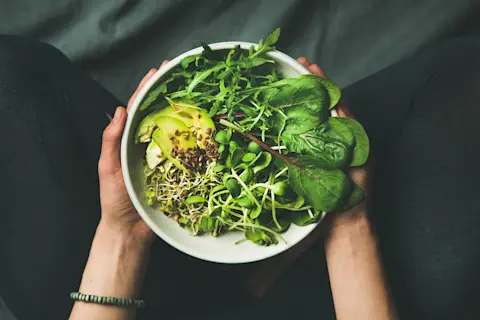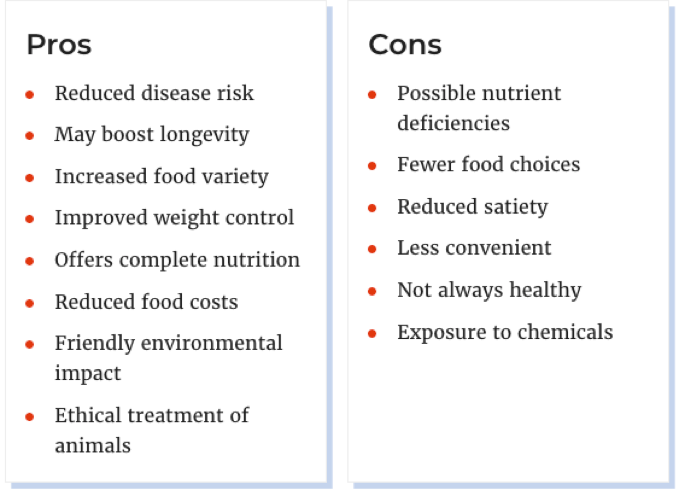Last Updated on January 14, 2026
Are you curious about switching to a vegan diet but unsure if it’s the right choice for you? Choosing what to eat affects your energy, health, and even your mood every day.
A vegan diet promises many benefits, but it also comes with some challenges you should know about. By understanding the pros and cons, you can make a decision that fits your lifestyle and goals. Keep reading to discover what a vegan diet really means for you and how it could change your life.

Credit: www.discovermagazine.com
Benefits Of Vegan Diets
Choosing a vegan diet can bring several benefits that affect your health, the planet, and your values. These benefits often motivate many people to try or stick with veganism. Understanding them can help you decide if this lifestyle fits your goals and beliefs.
Health Improvements
Switching to a vegan diet often leads to better heart health. Plant-based foods tend to be lower in saturated fat and cholesterol, which can reduce your risk of heart disease.
Many people notice weight loss and improved digestion after going vegan. This happens because you eat more fiber-rich fruits, vegetables, and whole grains.
Have you ever felt more energetic after cutting out animal products? Some report clearer skin and fewer headaches, showing how food choices impact your body.
Environmental Impact
Eating vegan can significantly reduce your carbon footprint. Animal farming produces more greenhouse gases than most other food sources.
Water use drops dramatically when you avoid meat and dairy. It takes about 1,800 gallons of water to produce just one pound of beef.
Think about the land saved by growing plants instead of raising animals. This can help preserve forests and wildlife habitats.
Ethical Considerations
Many choose veganism to avoid supporting animal cruelty. Factory farming often involves harsh treatment of animals.
By not buying animal products, you reduce demand for these industries. This can encourage more humane and sustainable farming practices.
Have you thought about how your food choices affect other living beings? Veganism challenges you to align your diet with compassion and respect for animals.
Challenges Of Vegan Diets
Choosing a vegan diet can feel empowering, but it also comes with its own set of challenges. Understanding these hurdles helps you prepare better and stay committed. Let’s look closely at some common issues you might face and how to handle them.
Nutritional Deficiencies
One big challenge is making sure you get all the nutrients your body needs. Vegan diets can lack vitamin B12, iron, calcium, and omega-3 fatty acids, which are mostly found in animal products.
Without careful planning, you might feel tired, weak, or face other health problems. It’s smart to add fortified foods or supplements to your meals. Have you checked if your meals include these vital nutrients?
Social And Cultural Barriers
Eating vegan in social settings can be tricky. Family dinners, parties, or eating out might not always offer vegan-friendly options.
You may feel left out or pressured to eat non-vegan food. Try bringing your own dish or suggesting restaurants with vegan choices. How do you handle social situations where your diet is different?
Accessibility And Cost
Depending on where you live, finding fresh fruits, vegetables, and vegan staples can be tough or expensive. Specialty vegan products often come with a higher price tag.
Shopping seasonally and locally can help cut costs. Planning your meals ahead also reduces waste and saves money. What are your strategies to keep a vegan diet affordable and accessible?
Tips For A Balanced Vegan Diet
Adopting a vegan diet can offer many health benefits, but it also requires careful attention to ensure you get all the nutrients your body needs. Balancing your meals is crucial to avoid common pitfalls like nutrient deficiencies or lack of variety. Here are some practical tips to help you stay healthy and energized on a vegan diet.
Essential Nutrients To Monitor
Some nutrients are harder to get from plants alone. Keep an eye on your intake of:
- Vitamin B12:Found naturally only in animal products, so you’ll need fortified foods or supplements.
- Iron:Plant-based iron isn’t absorbed as well, so eat iron-rich foods like lentils and spinach alongside vitamin C sources to boost absorption.
- Calcium:Choose fortified plant milks, tofu, and leafy greens to meet your calcium needs.
- Omega-3 Fatty Acids:Flaxseeds, chia seeds, and walnuts are great sources, but consider an algae-based supplement for better EPA and DHA levels.
- Protein:Combine various plant proteins like beans, grains, and nuts throughout the day to get all essential amino acids.
Are you tracking these nutrients regularly? It’s a simple step that can prevent long-term issues.
Meal Planning Strategies
Planning your meals helps avoid repetitive, boring dishes and ensures you get diverse nutrients. Use a weekly meal plan that includes a mix of legumes, whole grains, vegetables, nuts, and seeds.
Try cooking batches of staples like quinoa or chickpeas to save time. Mix these with different spices or sauces to keep meals exciting.
Don’t forget snacks! Nuts, fruit, and veggie sticks with hummus keep your energy steady and prevent overeating during meals.
Supplements And Alternatives
Even the most careful vegan might need supplements to fill nutritional gaps. Vitamin B12 is non-negotiable for most vegans. Look for reliable brands and take the recommended doses.
Consider vitamin D, especially if you have limited sun exposure. Algae-based omega-3 supplements provide EPA and DHA without fish oil.
Some people also benefit from iodine supplements, especially if they don’t use iodized salt or consume seaweed regularly.
Have you thought about which supplements fit your lifestyle best? Consult a healthcare provider to tailor your choices.

Credit: www.youtube.com

Credit: medium.com
Frequently Asked Questions
What Are The Main Benefits Of A Vegan Diet?
A vegan diet can improve heart health, lower cholesterol, and help with weight management.
Can A Vegan Diet Provide Enough Protein?
Yes, plant foods like beans, lentils, tofu, and nuts offer plenty of protein.
What Nutrients Might Be Missing In A Vegan Diet?
Vitamin B12, iron, calcium, and omega-3 fatty acids may be low without careful planning.
Is It Hard To Follow A Vegan Diet Every Day?
It can be challenging at first, but many find it easy with meal planning and variety.
Does A Vegan Diet Help With Weight Loss?
Many people lose weight on a vegan diet due to lower calorie and fat intake.
Conclusion
Choosing a vegan diet brings both benefits and challenges. It can improve health and help the environment. Yet, it may need careful planning to avoid missing nutrients. Many find it suits their lifestyle and values. Others might struggle with food choices or social situations.
Balance and knowledge make the difference. Think about your needs and goals. A well-planned vegan diet can work well for many people. The key is to stay informed and listen to your body.


